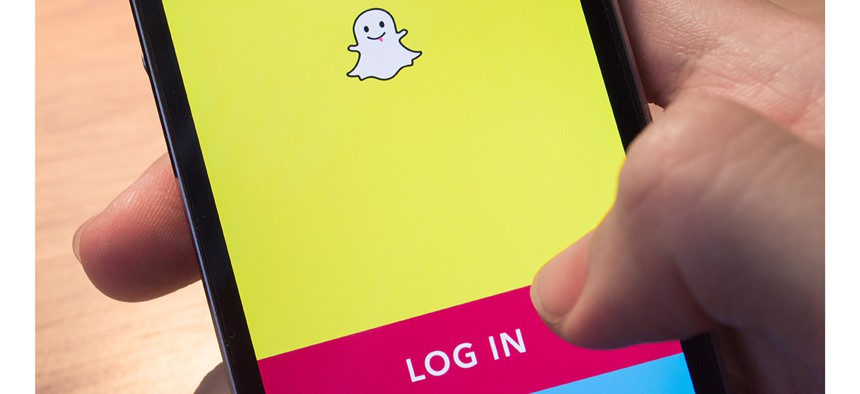Snapchat Is the Latest Tech Company to Be Sued for Mapping Faces

Wachiwit/Shutterstock.com
The popular messaging app says it doesn’t gather biometric information.
Snapchat is being dragged to a California federal court over a feature that outlines and maps the shape of your face.
Two Illinois residents in May sued Snapchat in California state court for allegedly capturing and storing facial recognition data without getting consent from users or disclosing how long it will be kept.
The app’s “sophisticated facial recognition technology extracts and analyzes data from the points and contours of the users’ faces,” according to plaintiffs Jose Martinez and Malcolm Neal. The class-action lawsuit accusing the company of violating the Illinois Biometric Information Privacy Act, filed in a Los Angeles County court in May 2016, was moved to federal court in mid-July.
The Snapchat app uses a mask to add special effects such as dog ears or flower headbands around a person’s face before taking a selfie on a smartphone. Snapchat acquired the animated filters, called Lenses, as part of its acquisition of startup Looksery in September 2015.
According to the lawsuit, Snapchat has created, collected and stored “face templates,” or highly detailed geographical maps of the face. Snapchat denies the claims.
“Contrary to the claims of this frivolous lawsuit, we are very careful not to collect, store or obtain any biometric information or identifiers about our community,” a Snapchat spokesperson said.
The popular messaging app says it doesn’t gather biometric information; it uses much simpler object recognition technology, not facial recognition technology.
“Object recognition is an algorithm designed to understand the general nature of things that appear in an image. It lets us know that a nose is a nose or an eye is an eye. But object recognition isn’t the same as facial recognition. While Lenses can recognize faces in general, they can’t recognize a specific face,” its privacy policy states.
Facebook and Google have also been sued in Illinois over their facial recognition software. That technology helps users accurately tag photos in Facebook Moments and Google Photos. Both companies have backed efforts to amend the state’s law. Facebook and Google did not respond to a request for comment.
While the use of facial recognition technology remains unregulated in most of the U.S., a California judge earlier this year ruled that the Illinois law could apply to any business as long as it operated in Illinois. A case against Facebook is proceeding in a federal district court in San Francisco. California-based photo-sharing website Shutterfly settled a case involving its face-scanning technology in April. The Illinois statute states “a retina or iris scan, fingerprint, voiceprint, or scan of hand or face geometry” are biometric identifiers. Photographs are not biometric identifiers, the law says.
The 2008 Illinois law provides that if companies fail to get consent from users before storing biometric information, they can be subject to a $5,000 fine per violation, and $1,000 in damages for negligent violation. Companies may also need to revise their privacy policies.





